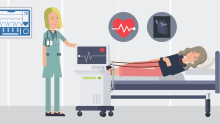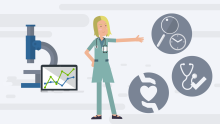Strengthening research and advancing healthcare
You can support medical research by providing your health data. This is how it works:

When you are treated at a clinic, your health and therapy data are collected. With your consent, the information gathered will be digitally connected nationwide and made available for medical research.

How does research on the collected data actually work? The treatment data gathered throughout Germany are pooled for research purposes. Thanks to this large data pool researchers can identify patterns that were not evident before. Such patterns allow for more accurate conclusions to be drawn about the causes of diseases and the treatment options.

Your health data will help to better detect diseases and develop new therapies in medical research. Medical research will in turn help physicians to detect diseases faster, treat them more effectively and prevent them. Your consent will help to make patient care even better.
FAQ: Medical Informatics Initiative
Scientists in the fields of medicine, information technology and other disciplines at German university clinics collaborate on the Medical Informatics Initiative (MII), a project funded throughout Germany. Its objective is to digitally connect patient data generated during hospital treatment nationwide. Research can thus be conducted on such data to better and faster treat diseases in the future.
The German Federal Ministry of Research, Technology and Space (BMFTR) is funding the initiative with more than EUR 400 million until 2026.
It is the aim of the Medical Informatics Initiative (MII) to make the patient data from routine care generated during hospital treatment available for medical research. The respective research results should help ensure to better detect, treat and prevent diseases as effectively as possible in the future. The MII is also meant to ensure that patients can benefit faster from validated research findings.
The data collected will contribute to gain new insights into the development of diseases, such as the interaction of genetic predispositions, lifestyle and environmental influences. Furthermore, the scientists expect to uncover information about risks and protective factors in diseases and the individual factors that influence the effectiveness of drugs and therapies. By combining all these findings, the overall goal is to enhance the healthcare provided to patients.
Many different stakeholders in the fields of medical research and healthcare are involved in the Medical Informatics Initiative (MII). The German Federal Ministry of Research, Technology and Space (BMFTR) funds the following four associations of clinics and other partners, the so-called consortia:
In these four consortia, all German university hospitals collaborate with research institutions and companies at more than 30 locations. In consultation with other stakeholders, such as health insurance companies, patient representatives and medical associations, they jointly develop the framework for research findings to directly benefit patients. A coordination centre organises and facilitates the interdisciplinary and nationwide collaboration of all parties concerned. It is managed by the TMF – Technology, Methods and Infrastructure for Networked Medical Research. The German Association of Medical Faculties (MFT) and the German Association of University Clinics (VUD) are also involved in the management of the coordination centre.
The Medical Informatics Initiative (MII) interlinks and provides patient data to researchers for various medical research purposes, so that the general public may benefit from such research. This is done with the aim to implement research findings in patient care, thereby optimising treatment and increasing patient safety: for example, diagnoses may be made in a faster and more precise manner, duplicate examinations may be avoided or adverse drug reactions may be prevented. Moreover, new technologies progressively enable personalised medicine. As a result, it will be increasingly possible to determine the best treatment approach before the therapy is due to start. Such personalised therapies may result in more successful treatments or fewer side effects.
When you are treated at a clinic taking part in the Medical Informatics Initiative (MII), trained clinic staff will inform you on how you may consent to the use of your data, and that you may withdraw your consent at any time. Of course you also have the opportunity to ask questions you may have. Following the informative discussion you will be asked to give your informed consent to the use of your data for medical research purposes. Your consent is voluntary, and you may withdraw your consent at any time without stating any reasons.
Unless you receive treatment at a clinic participating in the MII, you cannot give your consent to the use of your data for research purposes for the time being. All patients will, of course, benefit from the future improvements in healthcare resulting from the MII, regardless of participation in the initiative.
As it is not possible yet to determine the specific medical issues which the use of health data may help resolve in the future, the informed consent to the use of health data for medical research and healthcare purposes is phrased in general terms (broad consent). It is thereby ensured that the medical research conducted in Germany will also tackle future tasks and new challenges in a much faster manner thanks to data analyses.
Detailed information on the broad consent is provided in the patient information leaflet.
Patient information and the broad consent form are available here.
For Q&A regarding data privacy and security click here.
An overview of the research projects that were proposed and carried out within the framework of the MII is provided here.
Refer to www.medizininformatik-initiative.de for detailed information and latest research results of the MII.
An interactive map containing further information on the MII is available here.